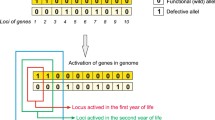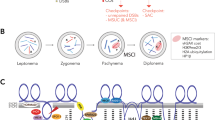Abstract.
The Y chromosomes are genetically degenerated and do not recombine with their matching partners X. Recombination of XX pairs is pointed out as the key factor for the Y chromosome degeneration. However, there is an additional evolutionary force driving sex-chromosomes evolution. Here we show this mechanism by means of two different evolutionary models, in which sex chromosomes with non-recombining XX and XY pairs of chromosomes is considered. Our results show three curious effects. First, we observed that even when both XX and XY pairs of chromosomes do not recombine, the Y chromosomes still degenerate. Second, the accumulation of mutations on Y chromosomes followed a completely different pattern then those accumulated on X chromosomes. And third, the models may differ with respect to sexual proportion. These findings suggest that a more primeval mechanism rules the evolution of Y chromosomes due exclusively to the sex-chromosomes asymmetry itself, i.e., the fact that Y chromosomes never experience female bodies. Over aeons, natural selection favored X chromosomes spontaneously, even if at the very beginning of evolution, both XX and XY pairs of chromosomes did not recombine.
Similar content being viewed by others
References
M.R. Rose, Evolutionary Theory of Aging (Oxford University Press, Oxford, 1991)
B. Charlesworth, Evolution in Age-Structured Populations (Cambridge University Press, Cambridge, 1991)
T.J.P. Penna, J. Stat. Phys. 78, 1629 (1995)
T.J.P. Penna, S.M. Oliveira, Phys. Rev. E 52, R3309 (1995)
M. Heumann, M. Hötzel, J. Stat. Phys. 79, 483 (1995)
N.G.F. Medeiros, R.N. Onody, Phys. Rev. E 64, 041915 (2001)
J.J. Bull, Evolution of Sex Determining Mechanisms (Benjamin Cummings, Menlo Park, California, 1983)
B. Charlesworth, Science 251, 1030 (1991)
B.T. Lahn, N.M. Pearson, K. Jegalian, Nature Rev. Genet. 2, 207 (2001)
B.T. Lahn, D.C. Page, Science 286, 964 (1999)
H. Skaletsky et al., Nature 423, 825 (2003)
S. Rozen et al., Nature 423, 873 (2003)
W.R. Rice, Science 263, 230 (1994)
H.A. Orr, Y. Kim, Genetics 150, 1693 (1998)
B. Charlesworth, D. Charlesworth, Phil. Trans. R. Soc. Lond. B 55, 1563 (2000)
J. Schneider, S. Cebrat, D. Stauffer, Int. J. Mod. Phys. C 9, 721 (1998)
W. Hwang, P.L. Krapivsky, S. Redner, Phys. Rev. Lett 83, 1251 (1999)
Author information
Authors and Affiliations
Corresponding author
Rights and permissions
About this article
Cite this article
Lobo, M., Onody, R. Degeneration of the Y chromosome in evolutionary aging models. Eur. Phys. J. B 45, 533–537 (2005). https://doi.org/10.1140/epjb/e2005-00218-0
Received:
Published:
Issue Date:
DOI: https://doi.org/10.1140/epjb/e2005-00218-0




